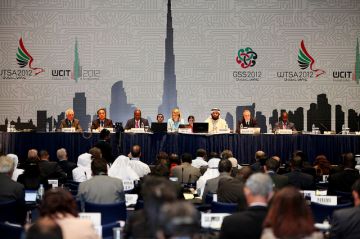Over the next two weeks at the World Conference on International Telecommunications (WCIT), members of the International Telecommunication Union (ITU) will review a treaty called the International Telecommunication Regulations (ITRs) for the first time since 1988.
The ITRs were originally intended to regulate and manage international telephone issues. But since 1988 the Internet has developed to an extent where its importance has grown significantly, arguably overtaking the telephone for communication in some parts of the world. Proposals have been put forth by ITU members to bring the Internet into the scope of the ITRs and, thus into the remit of ITU.
This sets the stage for a clash between the spontaneous nature of the Internet on one hand, with the regulated and linear nature of telephone systems on the other. Understandably, that clash is the focus of so much discussion and media coverage. What does this mean for businesses large and small, and for human rights?
The International Telecommunication Union (ITU) is a treaty-based organisation that is a specialised agency of the United Nations with 193 members. For the WCIT, each country member sends a delegation, including government officials, and individuals from business, civil society and academia. Countries like the US and the UK have a varied delegation while countries like China and Russia have mostly governmental officials with a few advisors from business and academia.
It is the lack of openness of the event that has been causing concern – and enough concern so that they do something about it. Google, for example, launched its campaign to keep the Internet free and open as a direct response to the WCIT proposals, arguing that Internet policy should be open and inclusive, the very principles the Internet was founded on.
Internet governance is a complex issue and has been approached thus far from a multistakeholder point of view based on openness. Borne out of the 2005 Tunis Agenda from the World Summit of the Information Society (WSIS), the Internet Governance Forum (IGF) is an annual meeting that has been free and open for everyone to attend. Regional meetings have taken place and they involve as many individuals and groups who want to participate. This year, panel discussions focused on everything from open data to cyber security to the process of Internet governance itself.
The ITU understands that. In several resolutions the ITU has stated that it has no remit over the Internet, based on the development and growth of this multistakeholder approach.
The WCIT comes in the face of the IGF process and multistakeholder approaches. Managing the Internet outside such processes is anathema to what has been happening over the last few years. But WCIT has been secretive: its documents and proposals have not been made public until outside websites like wcitleaks.org published the documents that they could find.
There is no reason why the international telecommunication regulations should have remit over the Internet. But some ITU members have proposed imposing binding mandates for Internet related activities.
The proposals aren’t necessarily overt. They put forth proscriptive, detailed proposals that would, based on how one interprets the proposals, curtail how the Internet works today. That has significant human rights implications – on security, privacy, the ability to conduct trade and business over the Internet, freedom of assembly and especially freedom of expression.
While states have the obligation to respect, protect and fulfill human rights, it is in the interest of some governments to regulate the Internet and monitor and restrict conversations and activism, and sometimes even to arrest those who exercise their rights. Greater state control is no solution.
A concise guide to the WCIT was released recently by LIRNEasia, a regional ICT policy and research organisation, and it provides a brief overview to some of the most perplexing proposals that cause concern. Some would impact economic growth. These are summarised below:
-
New regulations on access charges: These would be levied on all content coming into a network. Governments would determine and charge for all content that could be accessed from within its country including news, search, and blogs.
-
Regulating private entities: Governments would be able to regulation private, contractual agreements between entities including companies and individual users of the Internet.
-
Mandates overriding national sovereignty: The language proposed by some members of the ITU would create binding agreements for all member states thereby overriding national legislation. This could include additional tax, regulation, and other activities relating to the telephone and Internet. It would also adversely affect the protection and fulfillment of many rights.
-
Mission and jurisdiction creep: The ITU could expand its mission to areas that it does not and has not had responsibility for, nor the capability or expertise, thereby undermining its work. Though this, by no means, incorporates all of the proposals. It does offer a glimpse of the sort of issues being discussed and the manner in which decisions might be taken.
Over the next two weeks we will see what happens to these proposals and if countries choose to regulate the Internet itself through a binding treaty. European member states along with the US and others have taken the approach that the ITRs should be top-level guiding principles for how governments, individuals and businesses should operate. Actual governance should be the way it has always been – open and based on multi-stakeholder approaches. We shall see if that approach predominates and if the principles of multistakeholder Internet governance remain intact.





























How should businesses respond to an age of conflict and uncertainty?
As 2024 began, European Commission President Ursula von der Leyen aptly summed up our deeply worrying collective moment. As she put it, speaking at the annual World Economic Forum in Switzerland, we are moving through “an era of conflict and...
26 March 2024 | Commentary
Commentary by Scott Jerbi, Senior Advisor, Policy & Outreach, IHRB